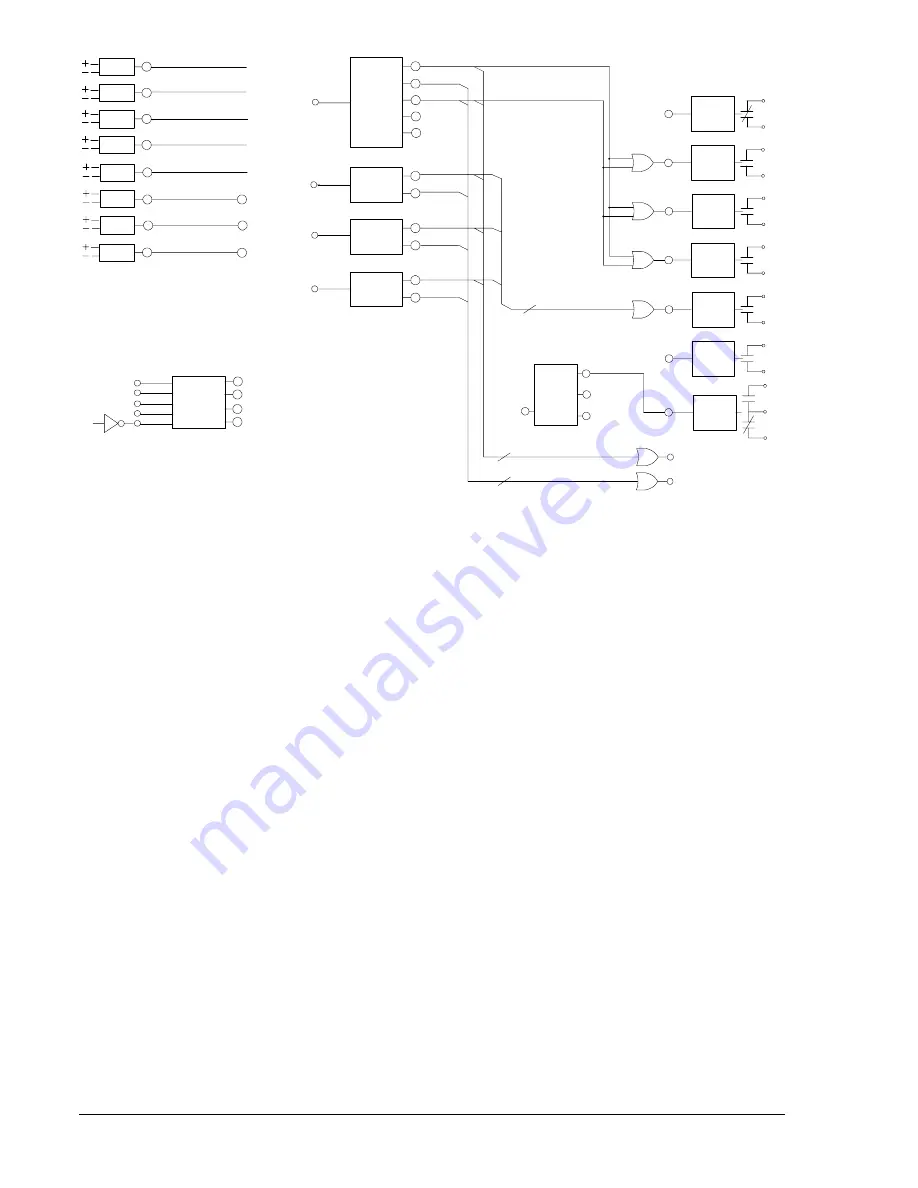
8-6 Application
BE1-CDS220
87
Mode1
87RT
87RPU
IN4 Not Used
OPTO
IN3 86 Status
OPTO
IN2 Breaker2 Status
OPTO
IN1 Breaker1 Status
OPTO
D2843-23.vsd
09-23-99
ACTIVE
SETTING
GROUP
CONTROL
Mode1
SG0
SG2
SG1
SG3
BLK
AUTO
D3
D2
D1
D0
5
Note: For clarity, multiple variables going to
the same OR Gate are shown by a single line
into the OR Gate.
87UT
2NDHAR
5THHAR
51P
Mode1
51PT
51PPU
51N
Mode1
51NT
51NPU
51Q
Mode1
51QT
51QPU
BLK
BLK
BLK
5
VO11 PROT TRIP
VO12 PROT PU
VOA
Relay
Trouble
OUTA
Output
Logic
VO1
87 Trip
OUT1
Output
Logic
VO2
87 Trip
OUT2
Output
Logic
Alarm
ALMMAJ
ALMMIN
ALMLGC
SA-
RESET
VO6
Major Alarm
Output
Logic
IN5 Not Used
OPTO
OPTO
IN6 Alarm
OPTO
IN8 Alarm
OPTO
VO13 Alarm Point 21
VO15 Alarm Point 23
IN7 Alarm
VO14 Alarm Point 22
VO3
87 Trip
OUT3
Output
Logic
VO4
51 Trip
OUT4
Output
Logic
OUT5
Output
Logic
VO5
Not Used
3
OUT6
0
Figure 8-2. Typical Logic Diagram for BASIC-87
Protection Elements
Referring to all four schemes (Generator, Motor, Bus, and Transformer) in Figure 8-1, the 87 protection
element is connected to CT input 1 and CT input 2. The 51 protection element is also connected to the CT
input 1. The 87 and 51 protection elements are logic enabled by the programming shown in Table 8-1 to
provide a trip through the BE1-CDS220 output contacts.
Typically, the 87 protection element provides high-speed percent restrained, phase, and ground protection
for faults inside the differential zone. For the generator, motor, and bus applications shown in Figure 8-1,
the percent-restrained differential protection function is the only function of the 87 protection element
required. Set the pickup of the 2
nd
, 5
th
, and 87 unrestrained functions to 0 (setting disabled). The 87
restrained function has a setting when the 2
nd
and 5
th
harmonic restraint functions are set for the
transformer application shown in Figure 8-1 (refer to the discussion in Overview of Preprogrammed Logic
Schemes).
Typically, the 51 protection element is coordinated with down-line protection devices to provide
overlapping Phase, Neutral, and Negative Sequence timed backup protection for zones beyond the
equipment being protected. In the low impedance, bus application, the 51 protection element must
coordinate with the feeder protection of the circuits connected to the bus.
Integration of Protection, Control, and I/O Elements
The logic settings in Table 8-1 also include the logic equations that connect the various elements of the
basic differential scheme. For example, the three underlined commands in the equations of Table 8-1
provide the electrical connection between the 87 element (trip enabled by the settings) and trip outputs 1,
2, and 3. Referring to Figures 8-1 and 8-2, the 87 protection element trips through outputs 1, 2, and 3. The
user can apply any or all of the outputs. The 51 protection element (also trip enabled by the settings) trips
through output 4. There are no virtual switches used in this application.
Control of the active setting group can be manual or automatic. For the BASIC-87 application, setting
group control is programmed for continuous automatic operation because the /0 (not 0), logic 1 is applied
to the AUTO input of the Active Setting Group Control Logic as shown in Figure 8-2.
Summary of Contents for BE1-CDS220
Page 2: ......
Page 10: ...viii Introduction BE1 CDS220 This page intentionally left blank...
Page 36: ...ii Quick Start BE1 CDS220 This page intentionally left blank...
Page 48: ...ii Input And Output Functions BE1 CDS220 This page intentionally left blank...
Page 66: ...iv Protection and Control BE1 CDS220 This page intentionally left blank...
Page 112: ...ii Metering BE1 CDS220 This page intentionally left blank...
Page 116: ...5 4 Metering BE1 CDS220 This page intentionally left blank...
Page 166: ...ii BESTlogic Programmable Logic BE1 CDS220 This page intentionally left blank...
Page 176: ...7 10 BESTlogic Programmable Logic BE1 CDS220 This page intentionally left blank...
Page 234: ...8 56 Application BE1 CDS220 This page intentionally left blank...
Page 236: ...ii Security BE1 CDS220 This page intentionally left blank...
Page 240: ...9 4 Security BE1 CDS220 This page intentionally left blank...
Page 242: ...ii Human Machine Interface BE1 CDS220 This page intentionally left blank...
Page 256: ...10 14 Human Machine Interface BE1 CDS220 This page intentionally left blank...
Page 258: ...ii ASCII Command Interface BE1 CDS220 This page intentionally left blank...
Page 422: ...14 32 BESTCOMS Software BE1 CDS220 This page intentionally left blank...
Page 424: ...ii Time Current Characteristics BE1 CDS220 This page intentionally left blank...
Page 452: ...ii Terminal Communication BE1 CDS220 This page intentionally left blank...
Page 456: ...C 4 Terminal Communication BE1 CDS220 This page intentionally left blank...
Page 458: ...ii Settings Calculations BE1 CDS220 This page intentionally left blank...
Page 475: ......
















































